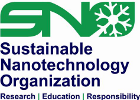Nanoinformatics Workshop
A One-Day Working Meeting to Establish Community Consensus on Zeta Potential Measures
Saturday, November 7, 2015 • Portland, Oregon
Increasingly, data integration is a visible challenge both within multidisciplinary research centers and across scientific disciplines. There are various consortia that focus on a common set of material samples as one means of creating a shared experimental domain for interpreting data across individual, research group and discipline boundaries. While necessary to forge progress, integrating data across consortia and sample sets remains a challenge, as does communicating the results to wider, non-academic audiences such as industry, regulators and funding agencies.
Anticipating the data integration hurdle, the National Cancer Informatics Program Nanotechnology Working Group, in partnership with the National Nanomanufacturing Network and the Sustainable Nanotechnology Organization is pursuing a series of pilot projects focusing on methods used across the therapy, human health and environmental communities, but with each subscribing to a different description of the resulting data. This is the case with electrokinetic phenomena: zeta potential, electrophoretic mobility, etc. These colloid science concepts are used in materials sciences, environmental engineering, nanotoxicology, nanomedicine, food science; they also form the basis for interpreting data from analytical techniques, e.g. gel electrophoresis, field flow fractionation, flow cytometry, and ultracentrifugation. Yet, there are meaningful and often overlooked differences in interpretation.
The Nanoinformatics Workshop will focus on the topic of “zeta potential” and its use/value from life sciences through to environmental engineering with particular attention paid to analytical techniques, data output and interpretation. As a disparate community, together we will examine the intended purpose of this measure within each field (separation, identification, characterization) including experimental challenges in sample preparation, reproducibility, reference materials, and needed metadata. Finally, we will address likely mis-interpretations or over-interpretations when integrating data across those same scientific fields. Anticipated outcomes are identifying the critical issues and defining best practices in taking data, reporting metadata, as well as selecting reference materials and controls. Our goals of this working meeting are the development of a decision tree complementary guidance document that tells you WHEN to do this measurement and a template for HOW to do and report zeta potential measurements. The workshop will be guided and documented by a group of social scientists who will provide support for our interdisciplinary discussions, document the team science approach and potentially produce a manuscript discussing the workshop motivations, methods and resulting recommendations.


